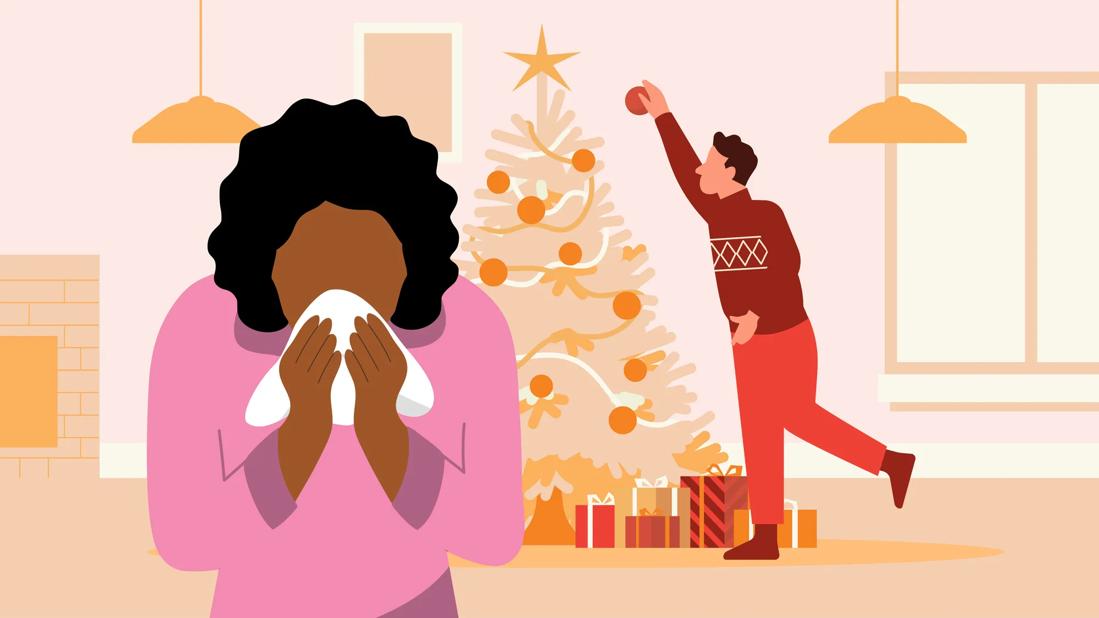You’re more likely to be allergic to the debris that came in with this festive evergreen

Image content: This image is available to view online.
View image online (https://assets.clevelandclinic.org/transform/60fef060-01e2-4cb5-aa29-a81c794291dc/christmas-tree-allergies-1804035268)
Person holds a tissue to their nose while another places an ornament on the Christmas tree
It’s the same story, year after year. You put on the carols, help yourself to a generous cup of eggnog and decorate the house for the holidays. It’s the stuff Christmas memories are made of.
Advertisement
Cleveland Clinic is a non-profit academic medical center. Advertising on our site helps support our mission. We do not endorse non-Cleveland Clinic products or services. Policy
But it’s hard to get into the spirit. Because as soon as that tree goes up, you feel awful.
It’s not a coincidence. It’s not humbug. And it doesn’t mean that you’re a Grinch at heart either. Nope, you just have a case of Christmas tree syndrome.
Christmas tree syndrome is basically just a fun name for an allergy exacerbation.
“When people bring a real or artificial tree into their home and notice some worsening of their allergy symptoms, it’s sometimes referred to as ‘Christmas tree syndrome,’” explains allergist DeVon Preston, MD.
There are lots of events that can kick our allergies into high gear, like turning on the heat for the first time or traveling somewhere new. If after putting up your Christmas tree, you find yourself sniffling, sneezing or struggling with other common allergy symptoms, your holiday décor’s probably bombarding you with irritants.
The only thing distinguishing Christmas tree syndrome from other (mild) allergy spikes is the festive circumstances. You’ll likely have the same symptoms you normally get when your allergies are running wild, like:
Christmas tree syndrome symptoms are unpleasant. But a slight exacerbation of your allergies isn’t life-threatening.
Advertisement
Severe allergic reactions, on the other hand, are medical emergencies. If you’re experiencing extreme allergy symptoms like shortness of breath, swelling of the tongue or a rapid heart rate, Dr. Preston urges you to call 911 or emergency services.
It’s called Christmas tree syndrome, so the cause is pretty obvious. Right?
Not really.
Turns out, being allergic to pine trees is rare. But it’s possible that smelling a pine tree could irritate your sinuses and lungs. That’s thanks to a chemical compound called terpene. Many strong-smelling plants have terpenes, including lavender, rosemary, thyme, basil, orange peels, cloves and ginger.
So, yes. Your tree could be the cause of your problems. But it probably isn’t the only cause.
Dr. Preston notes that Christmas trees — both real and artificial — tend to bring outdoor allergens into your home with them. Weed pollen, rosin, dust mites, insect droppings, pesticides and mold are just a few of the potential passengers. They’re also common triggers of allergic asthma.
It’s also possible that another part of your Yuletide décor is causing your allergies. Flocking (aerosolized artificial snow) can wreak havoc on your airway and trigger allergies. The same’s true of fireplaces, scented candles, seasonal plants and more.
There are lots of ways you can prevent or treat Christmas tree syndrome. Dr. Preston shares some tips to keep your season jolly.
Advertisement
Nobody likes to feel sick around Christmas. But if your allergies disappear with your holiday decorations, you may not think it’s important to talk to a healthcare provider about them.
But if you’re miserable over the holidays, it’s worth finding out why. That information could help you better manage your symptoms — and really enjoy your Christmas tree — in the years to come.
For some people, rocking around the Christmas tree can worsen their allergy symptoms. But there are many ways to prevent or manage Christmas tree syndrome side effects.
And while Christmas tree syndrome is a mild worsening of your typical seasonal allergies, it’s not the same thing as anaphylaxis. If you’re experiencing severe allergy symptoms, get immediate medical attention.
Advertisement

Sign up for our Health Essentials emails for expert guidance on nutrition, fitness, sleep, skin care and more.
Learn more about our editorial process.
Advertisement
Connecting with others, giving back and stepping away from social media can all help you cope
Define your relationship, set expectations and don’t plan too far in advance
Advice for smart holiday eating, while still enjoying yourself
OTC meds, rest, fluids and an anti-inflammatory diet can help you get through big and small weather changes
Honey, humidity and the right OTC meds can help bring on cough relief
Allergies, postnasal drip, asthma or reflux could be to blame for a cough that won’t quit
Correct positioning is one of the keys to getting the best results
Pink eye tends to start in one eye before spreading to the other, while allergies usually affect both eyes at the same time
Although it could be used as a moisturizer, this new trend is not recommended
Communicating clear limits helps protect your time, energy and emotional well-being
High cholesterol can be genetic, but testing and treatment can lower your heart disease risk